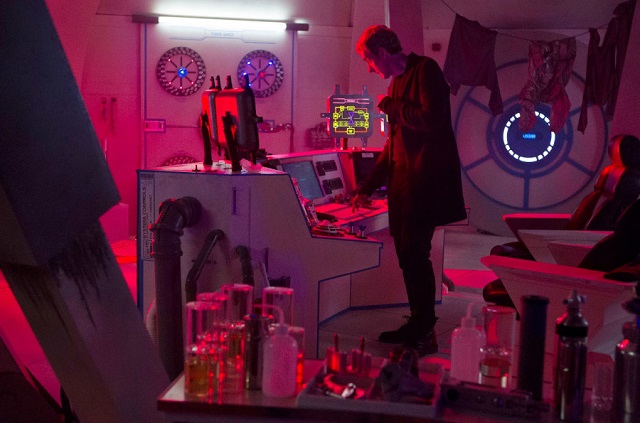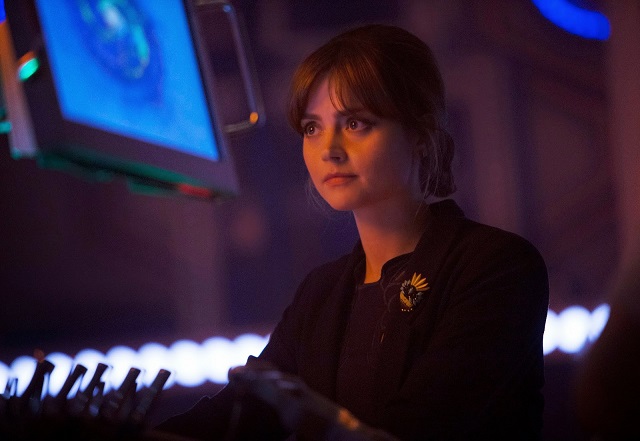
Written by Steven Moffat
Directed by Douglas Mackinnon
Airs Saturdays at 9pm ET on BBC America
This week, on Doctor Who: Clara goes on a date, the Doctor is afraid, and Rupert hates his name
Steven Moffat loves childhood fears. He’s mined them for some of nuWho’s most effective villains: Something lurking in the dark (the Vashta Nerada), a threat waiting to pounce the moment you look away (the Weeping Angels), and now, the monster under your bed. These creatures tap into the intense, pervasive fears so many experience as children and like its predecessors, “Listen” is hugely successful drawing from this well. It also takes a common and, when explored, curious habit and exploits it for significant dramatic potential: why do people talk to themselves when no one’s around? Both ideas have been explored by Moffat to some extent already (“The Girl in the Fireplace”, the Silence), and so here he puts them together, hoping that between the two, there’s enough new material to make the story work.
By themselves, these ideas aren’t enough; fortunately, they don’t need to be. The scares in “Listen” are saved from becoming tired retreads thanks to Murray Gold’s fantastic score, Peter Capaldi’s performance, Douglas Mackinnon’s direction, and Suzie Lavelle’s cinematography. Gold’s score is far from subtle, but it’s effective. The clustered, dissonant strings patiently rise only to drop back and climb ever higher without ever resolving. Tension seeps throughout the TARDIS scenes, Gold’s music keeping the audience on edge and not allowing them to breathe. Much of Capaldi’s performance in the episode fits with his work of the past three episodes, but the opening scene and the Doctor’s first exchange with Clara on the TARDIS are something else entirely. Here Capaldi beams, his face a wide, angular smile, and gives an under the breath chuckle that is utterly disconcerting. Mackinnon’s framing and Lavelle’s lighting contribute to this, casting shadows across his face and through the TARDIS that set the audience on edge. This is repeated later, when Clara and Orson sit in the TARDIS with the unconscious Doctor, unsure of what to do. The TARDIS for once is not a safe space, a viscerally upsetting feeling that Mackinnon and Lavelle capture powerfully.
 The episode finds success beyond its excellent execution of familiar Who horror beats, however, thanks to Clara and Danny’s arc. Just like in “Blink”, the dramatic through-line of “Listen” is what brings it together, adding depth and stakes to the proceedings. Yes, the Weeping Angels are hide-behind-the-couch-scary in their first outing, but that only matters because the viewers really like Sally Sparrow. Here, the being under the blanket is creepy, but only because Samuel Anderson (Danny), Remi Gooding (Rupert), and the writers have done a fantastic job introducing Mr. Pink. He’s terrified, and so is Clara (the Doctor doesn’t seem particularly relaxed either), and that’s enough of a reason for the audience to be as well.
The episode finds success beyond its excellent execution of familiar Who horror beats, however, thanks to Clara and Danny’s arc. Just like in “Blink”, the dramatic through-line of “Listen” is what brings it together, adding depth and stakes to the proceedings. Yes, the Weeping Angels are hide-behind-the-couch-scary in their first outing, but that only matters because the viewers really like Sally Sparrow. Here, the being under the blanket is creepy, but only because Samuel Anderson (Danny), Remi Gooding (Rupert), and the writers have done a fantastic job introducing Mr. Pink. He’s terrified, and so is Clara (the Doctor doesn’t seem particularly relaxed either), and that’s enough of a reason for the audience to be as well.
Once again this season, Clara centers the episode, and once again, this proves to be a wise decision. Her progressing relationship with Danny works incredibly well (their banter over dinner is adorable and legitimately funny, no small feat), as does her sense that their fates are entwined. Clara’s reaction to this, a mix of fear and excitement, is infectious and if Moffat is trying to build up strong fan support for the couple, this episode should certainly do it. Of course, even this storyline is one the series has done before, and recently (in “Hide”, when Emma wound up helping her descendent, a pioneering time-traveler who wound up stuck), but the audience’s personal connection to Clara and to a lesser extent, Danny, distracts from this.
“Listen” is one of nuWho’s best examples of an episode that suffers from a concept Alfred Hitchcock proffered called fridge logic—the audience finishes watching and everything seems great, until later that night, when they go to the fridge for a snack and a flaw or problematic scene pops absentmindedly into their head, unraveling the experience. The episode leaves several questions hanging (the chalk, the being/alien-masked child, the “Midnight”-style knocking at the “Utopia”-style last planet in time) and layers on the “probably”s thicker and thicker until the resolution at the end, that there really is nothing there, is completely unsatisfying. These moments last one or two “probably”s too long and even a touch more restraint or ambiguity with the camera would make Clara’s conclusion more successful. However, none of these is the fridge realization.
 The episode’s biggest problem is its central conceit: Why can’t Clara allow the sleeping child to see her? Even if it is the Doctor (yes, yes, it’s almost assuredly the Doctor, and frankly, if it isn’t, this critic’ll be incredibly annoyed, but technically, it’s never confirmed), she’s already met every one of his regenerations and interfered in his lives time and again. Why would this be any different? It’s been firmly established that the Doctor forgets faces. The only reason she doesn’t show herself is because the story needs her not to, and this contrivance opens the door to recognizing the episode’s other faults and similarities to so many Moffat stories. Loving and sweet as Clara’s talk to the sleeping boy is (shades of “The Bing Bang”), this answer to the Doctor’s initial question is an underwhelming conclusion to an otherwise very effective episode.
The episode’s biggest problem is its central conceit: Why can’t Clara allow the sleeping child to see her? Even if it is the Doctor (yes, yes, it’s almost assuredly the Doctor, and frankly, if it isn’t, this critic’ll be incredibly annoyed, but technically, it’s never confirmed), she’s already met every one of his regenerations and interfered in his lives time and again. Why would this be any different? It’s been firmly established that the Doctor forgets faces. The only reason she doesn’t show herself is because the story needs her not to, and this contrivance opens the door to recognizing the episode’s other faults and similarities to so many Moffat stories. Loving and sweet as Clara’s talk to the sleeping boy is (shades of “The Bing Bang”), this answer to the Doctor’s initial question is an underwhelming conclusion to an otherwise very effective episode.
Fortunately, Clara’s creation of the young boy’s dream isn’t the episode’s actual end. Its final moments tie the episode’s thread of fear to Clara and Danny’s relationship, the leap that they each sabotage themselves from making during their dinner, and this works incredibly well. Army Man Dan winding up with the young Gallifreyan is a rather bizarre note to end on, but knowing Moffat, there may be more coming later in the season that will explain this. It’s anyone’s guess how long it will take Danny to come aboard the TARDIS, but with Coleman and Anderson’s excellent chemistry, it’s hard not to be impatient. Still, Moffat and co. have handled the character beautifully to this point and have earned the benefit of the doubt where Danny’s concerned. The closest Doctor Who has ever come to exploring a Companion’s relationship (with someone who isn’t aboard the TARDIS) is Rose and Mickey, but those two were all but broken up the moment Rose went off with the Ninth Doctor. It’s hard to imagine Clara and Danny having a significant relationship without Danny joining the TARDIS team, but it could certainly make for an intriguing new dynamic.
“Listen” is Moffat’s first scarefest in a while and it’s one of his most effective, despite its familiarity. There are only so many times Moffat will be able to return to these same wells of horror, and they certainly appear to be getting a bit dry, but when his pet tropes are executed this adeptly, they can still pack a punch.
Kate Kulzick

